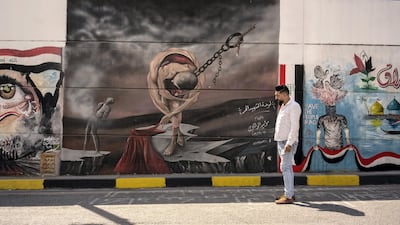Under the unforgiving sun, volunteers spray water from hoses to scrub clean Baghdad’s Tahrir Square.
Young artists touch up the murals, portraits and graffiti painted on an underpass near the square at the height of the pro-reform protests that broke out in Iraq last October.
As the first anniversary of the rallies approaches, they also add new artistic expressions of their frustration at the government.
Activists plan to use October 1 to reignite the protest movement, which died down in recent months because of the coronavirus pandemic and the killings, kidnappings and intimidation of demonstrators.
In addition to their original demands for better living conditions and political change, they say they will press for those behind protesters’ killings to be brought to justice.
“October is the date for the revolutionaries,” reads one of many posters put up around Baghdad to encourage people on to the streets again.
“We will be back,” reads another message scrawled on a wall in the southern city of Nasiriyah, another protest centre. “The storm of October is coming.”
Unlike other protests since the 2003 US-led invasion which toppled long-time dictator Saddam Hussein, these demonstrations started spontaneously.
Angry young people took to the streets in Baghdad before protest fever spread to other cities in central and southern Iraq.
The demonstrators demanded jobs, better services, an end to endemic corruption and an overhaul to the sectarian political party system in place since 2003.
They want early elections under a new law that gives independent candidates a better chance to win seats in Parliament.
Government security forces responded with live rounds, tear gas and stun grenades, setting off clashes with the demonstrators.
At least 560 people, mostly protesters, have been killed, the government said. Thousands were wounded.
The government resigned weeks after the start of the protests
A new government which took office in May has mooted June 2021 as a possible date for elections, although discussions on changing the electoral law have not been concluded.
"None of our demands are met yet," activist Haider Al Hilfi told The National while sitting inside a tent in Tahrir Square.
“We will rise up again on October 1 in a new revolution.”
For months, Baghdad’s Tahrir Square was a bustling centre for thousands of protesters who turned it into a vibrant village of tents filled with young men and women from all walks of life.
But things started to change early this year. Activists were attacked when outside the square, reportedly by Iran-backed militias.
Informants mingled with the protesters, forcing many of them to abandon the camp.

Days into the protests, the demonstrators took over the abandoned 14-storey Turkish Restaurant building from the security forces who oversee the Green Zone, where key government offices and western embassies are based.
The building became a landmark for the protest movement and was renamed Jabal Uhud, a reference to a mountain in Saudi Arabia where a historic battle took place.
Now the square is almost deserted, with many tents empty and torn.
“People lost trust in the square when it was infiltrated by the political parties,” says activist Mustafa Abid, who arrived on a motorcycle to check on anniversary preparations.
“But we managed to unify our ranks. We are now working in our areas and on social media to regain trust and muster people to come to the square to commemorate the anniversary.”
When he took office in May, Prime Minister Mustafa Al Kadhimi promised investigations into the killings of the protesters, and compensation for the dead and wounded.
The government’s investigation has yet to begin. It says it will start soon after a list of the victims has been finalised.
No payment has been made and no charge filed so far.
Younis Khalifa, 23, bursts into tears as he sits next to a section of the square where pictures of the dead are hung or placed on the ground, surrounded by their bloodstained belongings, plastic flowers and copies of the Quran.
“The people let down the protests,” Mr Khalifa says, expressing disdain for Iraqis who failed to back the movement when the killing began.
“What hurts most is that we have achieved nothing, despite the blood that has been shed.”
In the southern city of Basra, activist Sameer Rahim does not rule out confrontations with security troops when resuming protests, but said there will be a response from the protesters.
“We expect heavy-handed response this time as well, but not the same one that we saw last year,” Mr Rahim says.
“The government and political parties will think twice before firing a bullet because the protesters today are different, they will retaliate immediately the same way.”
He expects the Basra protests will be bigger because they will be fuelled by an “alteration” of borders by neighbouring Kuwait, and a delay in building a major port on the Gulf.
Back in Tahrir Square, Mr Khalifa pledges to return on October 1.
“To those [who died] I say: ‘We will not forget you and we will carry on’,” even at risk of death.










